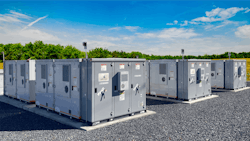The Caribbean Island of Curacao Installing 25 MW Wartsila BESS to Mitigate Risk of Brownouts and Blackouts
Aqualectra, the Caribbean island of Curacao's government-owned utilities company, has partnered with Wartsila to install a 25 MW Battery Energy Storage System (BESS) on the island.
The BESS, in partnership with Wartsila's digital energy platform, will provide grid stability and reliability, reduce unserved energy, smooth the intermittency of renewables, and help mitigate the risk of brownouts and blackouts.
“Aqualectra’s strategic objective is to provide the community with affordable, sustainable, and reliable electricity. The Wartsila solution will support all these objectives through reducing generation costs, enabling the integration of renewables, and decreasing CO2 emissions while providing high reliability,” said Joseph Everon, Advisor to the CTO at Aqualectra.
Wartsila is scheduled to deliver the equipment in Q1 2025, and the project is expected to be fully operational by the end of Q2 2025.
About the Author
EnergyTech Staff
Rod Walton is head of content for EnergyTech.com. He has spent 17 years covering the energy industry as a newspaper and trade journalist.
Walton formerly was energy writer and business editor at the Tulsa World. Later, he spent six years covering the electricity power sector for Pennwell and Clarion Events. He joined Endeavor and EnergyTech in November 2021.
He can be reached at [email protected].
EnergyTech is focused on the mission critical and large-scale energy users and their sustainability and resiliency goals. These include the commercial and industrial sectors, as well as the military, universities, data centers and microgrids.
Many large-scale energy users such as Fortune 500 companies, and mission-critical users such as military bases, universities, healthcare facilities, public safety and data centers, shifting their energy priorities to reach net-zero carbon goals within the coming decades. These include plans for renewable energy power purchase agreements, but also on-site resiliency projects such as microgrids, combined heat and power, rooftop solar, energy storage, digitalization and building efficiency upgrades.
